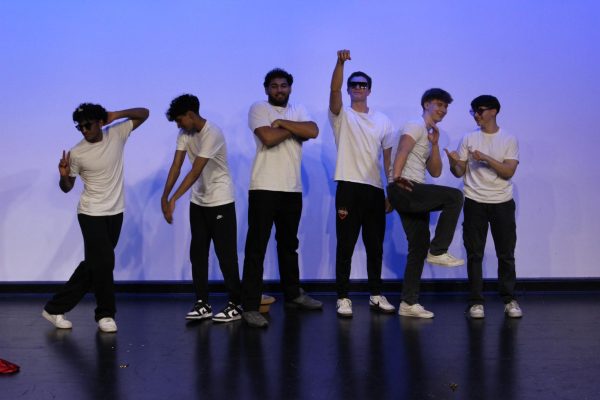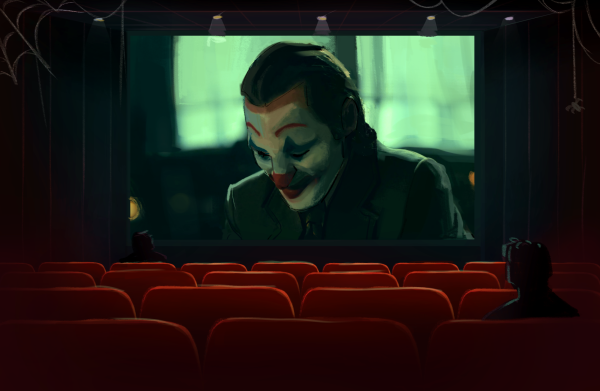Keep One Eye Open
Clipping push limits of the mind on ‘Visions of Bodies Being Burned’
Fear: one of the most primal and visceral emotions of the human mind. Yet compared to all other emotions, it seems so rarely explored in music.
Often set aside to the underground, or buried in avant-garde genres and artists’ discographies, horrorcore and all of the sounds that entail it are so limited and uncommon today. But Clipping, a Northern California-based experimental hip-hop group, has never shied away from integrating boundary pushing sounds into a traditionally banger-influenced genre. This holds true for their newest record, “Visions of Bodies Being Burned.”
Fronted by Daveed Diggs, who gained notoriety both for his role with Clipping and later on Broadway as Thomas Jefferson in “Hamilton: An American Musical,” the band began releasing music to critical acclaim with their EP Midcity in 2013. The band quickly became a cult classic. For the last seven years, they have been consistently releasing conscious and experimental hip-hop at an unparalleled level. But on their newest record, they have found a way to top themselves yet again.
The album’s title cues to any listener the grimness of the lyricism, and the imagery of Diggs’ writing on this record. But even that couldn’t tell the whole story of just how unexpectedly horrific an album like this is.
Beginning with the pounding drum and ominous creaking of sampled creaking gates and rusty swings in the background, “Intro” comes into the frantic and static-filled rapping of Diggs’ voice at first slowing from a rapid fire pace, to an unnerving and off-kiltered pace, highlighting the extraordinary and dark writing that has come to define the band.
Its first and only verse depicts a monster stomping through a forest, as if each 808 is its own footstep, coming closer and closer to the listener. Suddenly, it shifts back to a head-spinning pace, a blinding series of verses that daze, which, paired with musique concrète-esque, erratic storytelling, culminates in what can be assumed to be the monster overtaking them before they even get to scream. The lyricism of the first track ends with “focus on fixing so cover your throat,” suggesting the victim is in such awe of the beast that they are unable to even scream.
With this, the record introduces to us exactly what it entails. Pounding and rolling drums, electronic and in your face synthesizers, and the brutal sonic assault of noise and its subgenres, all in order to serve horrific and terrifying lyricism.
One of the most profound and vivid moments on the album enters with “She Bad,” played with a limited instrumental initially, allowing Diggs to build a clear narrative of a folktale spread amongst village children of a witch who lives in a cabin deep in the forest and has, as Diggs describes it, a serpent forked tongue, closed snake eyes, and rotten skin.
He then paints a group of people, once village children who come to face their fears in the woods by finding the witch that had terrified their childhoods. Coming into the chorus, it is clear that there is nothing left for them, foretelling that all who visit the cabin are eaten alive, finishing with overwhelming and grandiose noise-esque erratic sounds, unmastered and raw, displaying the supernatural and impossible nature of the horror they experienced and their untimely deaths.
Later in the album, Clipping show they aren’t afraid to play out some straight bangers with the song “Check the Lock”, an almost humorous recount of a gangster or mob boss who, as Diggs describes him, essentially runs the town. Despite his assumed power, it becomes clear this man fears something beyond this world following a supernatural encounter with a beast of some kind.
On the chorus the band produces a smooth, almost funky bass line, reminiscent of Nine Inch Nails, and plays with arpeggiated rising synthesizers, telling how no matter how hard he may seem on the outside, after his experiences he can’t help but fear every step he takes. The song reveals its meaning plainly, that “Laughing at him, he ain’t ever scared though, but he checks the lock every time he walks by the door.”
Playing with ingenious wordplay, Diggs uses lines like “He ain’t goin soft just ‘cause he got Olay,” to build in double entendres of how he is perceived to be soft because of the poshness lotion he uses, the literal softness of his hands because of the lotion, and literally how he’s going soft because of his paranoia of monsters and the horrors he has experienced. No matter how soft he may seem to his friends, or how imposing he may try to appear, they may never know the impossibility and incredible nature of his encounter.
Diggs proceeds to pull out an absolute masterpiece on what I consider to be the best song on the album: “Looking Like Meat.” Everything Diggs has developed over the course of this album and through Clipping culminates with this song, depicting an act of brutal cannibalism.
It begins with blown out bass, and blistering, abrasive industrial instrumentals and noises that play underneath rhythmically unique and devastating lyrics, describing a cannibalistic society where at the desperation of their members, lure in others simply to eat them, even beginning to enjoy their inhuman tendencies.
Daveed plays with clear yet dense writing, pairing lines like “Brazy on the brain, crack the skull, go on eat,” describing the indoctrination of a member tasting raw, human flesh for the first time, with others like “Like Christ you don’t still get a mic, no one cares about your bars. Your screams are thing they wanna hear,” illustrating the sadistic pleasure the society finds in the pain of others as they are brutally murdered. The quiet yet ever-present piano melodies from a music box play against the harsh and raw sounds of the electronic and metallic noises remind listeners of both the pleasure of the actors and the pure fear of the victims, filling the ears with unease.
The finale to the song only comes after it however, with “Drove,” an interlude, composed simply of a recording of animals roving and making noises. The wide-eyed horror Clipping lays out is the way these members view humans, as animals to be farmed and eaten, explaining the song’s title, that we are nothing more than meat to them.
Clipping has created an album that is an absolutely terrifying and deathly experience that frankly, is not for everyone. It is for those willing to bring themselves into the unknown, into the darkness of the mind and the human psyche. Whether it be the description of supernatural and horrific demons, or the real-life terrors of humanity, they have aptly created an album with instrumentals and soundscapes like no other that instill deep-seeded fears into any listener.
Music like this pushes what it means to be human, and lets us dip our toes into what otherwise is considered manic and cruel, insane and horrific. While the majority of people will never be willing to give this album a try, a message for those of you who do: be warned, be wary, watch your step, and sweet dreams.
Samuel Minioza is a sophomore at Dougherty Valley High School.




kait • Dec 17, 2020 at 12:11 am
Woah this writer is so good! I completely agree with everything they said. I really want to be friends with this person cause they know what they are talking about. They seem like they have a lot of opinions. They’re friends must love listening to them complaining about people around them. oLMAO
Samuel Minioza • Dec 17, 2020 at 12:05 am
Wow this writer is clearly on a roll! Nice job! Keep it up! I want to be friends with them for sure!